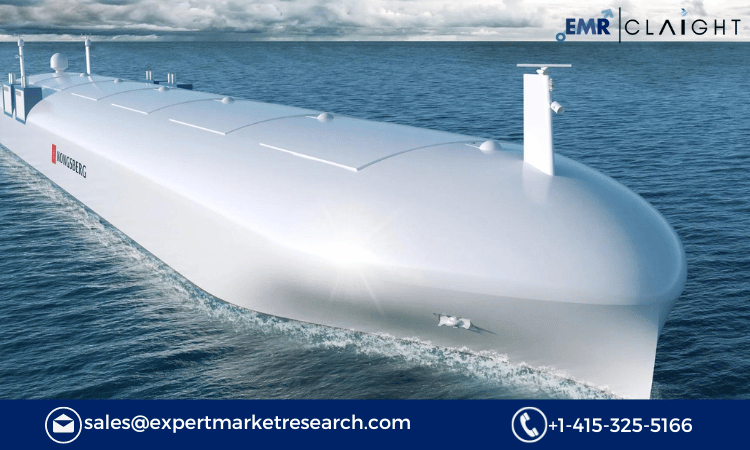According to the report by Expert Market Research (EMR), the global autonomous ships market is projected to grow at a CAGR of 7.2% between 2024 and 2032. Aided by the growing demand for efficient and cost-effective maritime transport solutions and the increasing advancement in autonomous technologies, the market is expected to grow significantly by 2032.
Autonomous ships, also known as unmanned or crewless ships, represent a significant innovation in the maritime industry. These vessels are equipped with advanced sensors, navigation systems, and artificial intelligence (AI) to operate independently or with minimal human intervention. The main advantages of autonomous ships include improved safety, reduced operational costs, and enhanced efficiency in maritime operations.
The burgeoning global trade and the corresponding demand for maritime transport have been instrumental in the growth of the autonomous ships market. With the increasing need to optimize shipping routes and reduce human error, autonomous ships provide a viable solution to modern shipping challenges. Additionally, the rising concerns over maritime safety and the stringent regulations imposed by international maritime organizations have further propelled the adoption of autonomous ships.
Get a Free Sample Report with a Table of Contents: https://www.expertmarketresearch.com/reports/autonomous-ships-market/requestsample
Another substantial driver that adds value to the autonomous ships market size is the continuous innovation in AI, machine learning, and sensor technologies. Leading companies are investing heavily in research and development to design advanced systems that ensure safe and efficient navigation, collision avoidance, and real-time decision-making capabilities. These technological advancements are crucial in enhancing the reliability and performance of autonomous ships.
As per the autonomous ships market analysis, the growing interest of shipping companies in reducing crew-related costs and addressing the shortage of skilled maritime professionals has significantly boosted the market. Autonomous ships eliminate the need for large onboard crews, thereby reducing labor costs and associated expenses. Furthermore, the ability to operate remotely offers shipping companies greater flexibility and operational efficiency.
The increasing environmental awareness and the push towards sustainable maritime practices have also contributed to the market growth. Autonomous ships are designed to optimize fuel consumption and reduce emissions, aligning with global efforts to combat climate change and promote green shipping initiatives. By integrating eco-friendly technologies, autonomous ships can help the maritime industry achieve its sustainability goals.
However, while the market is poised for robust growth, it is imperative for players to address potential challenges such as cybersecurity threats, regulatory compliance, and the integration of autonomous ships into existing maritime infrastructure. By proactively tackling these issues, companies can ensure the successful deployment and operation of autonomous ships.
Read Full Report with Table of Contents: https://www.expertmarketresearch.com/reports/autonomous-ships-market
Market Segmentation
The market can be divided based on type, autonomy level, end-use, and region.
Market Breakup by Type
- Commercial Ships
- Defense Ships
- Passenger Ships
Market Breakup by Autonomy Level
- Fully Autonomous Ships
- Semi-Autonomous Ships
- Remote-Operated Ships
Market Breakup by End-Use
- Cargo and Logistics
- Oil and Gas
- Defense and Security
- Others
Market Breakup by Region
- North America
- Europe
- Asia Pacific
- Latin America
- Middle East and Africa
Competitive Landscape
The EMR report looks into the market shares, plant turnarounds, capacities, investments, and mergers and acquisitions, among other major developments, of the leading companies operating in the global autonomous ships market. Some of the major players explored in the report by Expert Market Research are as follows:
- Rolls-Royce Holdings plc
- Kongsberg Gruppen ASA
- ABB Ltd.
- Wärtsilä Corporation
- Mitsui O.S.K. Lines, Ltd.
- NYK Line (Nippon Yusen Kabushiki Kaisha)
- Yara International ASA
- ASV Global
- L3 ASV
- Hyundai Heavy Industries Co., Ltd.
- BAE Systems plc
- Others.
Market Drivers
Technological Advancements
The continuous advancements in autonomous technologies, including AI, machine learning, and sensor systems, are driving the growth of the autonomous ships market. These technologies enable ships to operate independently with high precision, improving navigation, safety, and operational efficiency.
Cost Efficiency
Autonomous ships offer significant cost savings by reducing the need for large crews, minimizing human errors, and optimizing fuel consumption. The ability to operate remotely and automate routine tasks contributes to lower operational costs, making autonomous ships an attractive option for shipping companies.
Safety and Environmental Concerns
The increasing focus on maritime safety and environmental sustainability is propelling the demand for autonomous ships. These vessels are equipped with advanced systems that enhance safety by preventing collisions and optimizing routes. Additionally, autonomous ships contribute to environmental sustainability by reducing fuel consumption and emissions.
Growing Global Trade
The expansion of global trade and the rising demand for efficient maritime transport solutions are boosting the market. Autonomous ships provide a reliable and cost-effective means of transporting goods across long distances, meeting the needs of a growing global economy.
Market Challenges
Regulatory Compliance
The development and deployment of autonomous ships are subject to stringent regulations and standards set by international maritime organizations. Ensuring compliance with these regulations can be challenging and requires significant investment in research and development.
Cybersecurity Threats
Autonomous ships are vulnerable to cybersecurity threats, including hacking and data breaches. Ensuring the security of onboard systems and protecting them from cyber-attacks is a critical challenge that needs to be addressed to ensure the safe operation of autonomous ships.
Integration with Existing Infrastructure
Integrating autonomous ships into existing maritime infrastructure poses significant challenges. Ports, shipping lanes, and regulatory frameworks need to be adapted to accommodate autonomous vessels, requiring substantial investment and coordination among stakeholders.
Future Trends
Increased Adoption of AI and Machine Learning
The future of autonomous ships will be heavily influenced by advancements in AI and machine learning. These technologies will enhance the decision-making capabilities of autonomous systems, enabling ships to operate more efficiently and safely in complex maritime environments.
Expansion of Remote Operations
The trend towards remote operations is expected to continue, with more shipping companies adopting remote control and monitoring systems. This will provide greater flexibility and operational efficiency, allowing ships to be managed from centralized locations.
Collaboration with Technology Providers
Collaborations between shipping companies and technology providers will play a crucial role in the development of autonomous ships. By working together, these stakeholders can leverage their expertise to design advanced systems and overcome technical and regulatory challenges.
Focus on Sustainability
The push towards sustainability will drive the adoption of eco-friendly technologies in autonomous ships. Innovations in alternative fuels, energy-efficient systems, and emission reduction technologies will be crucial in meeting global sustainability goals and reducing the environmental impact of maritime transport.
The global autonomous ships market is poised for significant growth in the coming years, driven by technological advancements, cost efficiency, and the increasing focus on safety and environmental sustainability. While the market presents substantial opportunities, addressing challenges such as regulatory compliance, cybersecurity threats, and integration with existing infrastructure will be critical for the successful deployment and operation of autonomous ships. By leveraging advancements in AI, machine learning, and eco-friendly technologies, the maritime industry can achieve greater efficiency, safety, and sustainability, paving the way for the future of autonomous shipping.
About Us
Acquire unparalleled access to critical industry insights with our comprehensive market research reports, meticulously prepared by a team of seasoned experts. These reports are designed to equip decision-makers with an in-depth understanding of prevailing market trends, competitive landscapes, and growth opportunities.
Our high-quality, data-driven analysis provides the essential framework for organisations seeking to make informed and strategic decisions in an increasingly complex and rapidly evolving business environment. By investing in our market research reports, you can ensure your organisation remains agile, proactive, and poised for success in today’s competitive market.
Don’t miss the opportunity to elevate your business intelligence and strengthen your strategic planning. Secure your organisation’s future success by acquiring one of our Expert Market Research reports today.
Media Contact
Company Name: Claight Corporation
Contact Person: Ian Bell, Corporate Sales Specialist
Email: [email protected]
Toll Free Number: +1-415-325-5166 | +44-702-402-5790
Address: 30 North Gould Street, Sheridan, WY 82801, USA
Website: www.expertmarketresearch.com











